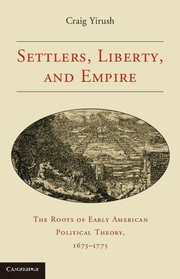7 - In Search of a Unitary Empire
Published online by Cambridge University Press: 05 June 2012
Summary
By the time the controversies over the prerogative in Virginia had died down in 1764, the empire was on the brink of a more serious dispute, one that involved the very question that Bland had raised only to dismiss: What was the extent of parliamentary authority in the internal affairs of the British American colonies? That this became the point of contention in the mid-1760s indicates that the locus of authority in the empire had shifted from the royal bureaucracy to the ministry. To understand this evolution, we need to go back to the oft-forgotten decades of the early to mid-eighteenth century, when, following the ill-fated attempt on the colonial charters, the empire experienced several decades without any serious constitutional strife. In an era of Whig hegemony at home and peace abroad, the colonies were left largely to their own devices. This laissez-faire policy facilitated the gradual accretion of power by the colonial assemblies at the expense of royal authority. However, a small group of officials in London saw these decades of lax oversight as anything but “a wise and salutary neglect.” As a result, they called for a wide-ranging reform of the empire's loose and unwieldy political structure. These reforms, predicated on the claim that Parliament was the ultimate sovereign in the empire, would tear the British Atlantic world apart in the 1770s.
- Type
- Chapter
- Information
- Settlers, Liberty, and EmpireThe Roots of Early American Political Theory, 1675–1775, pp. 183 - 214Publisher: Cambridge University PressPrint publication year: 2011



